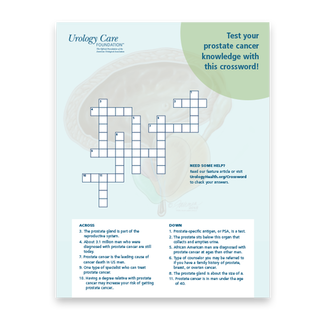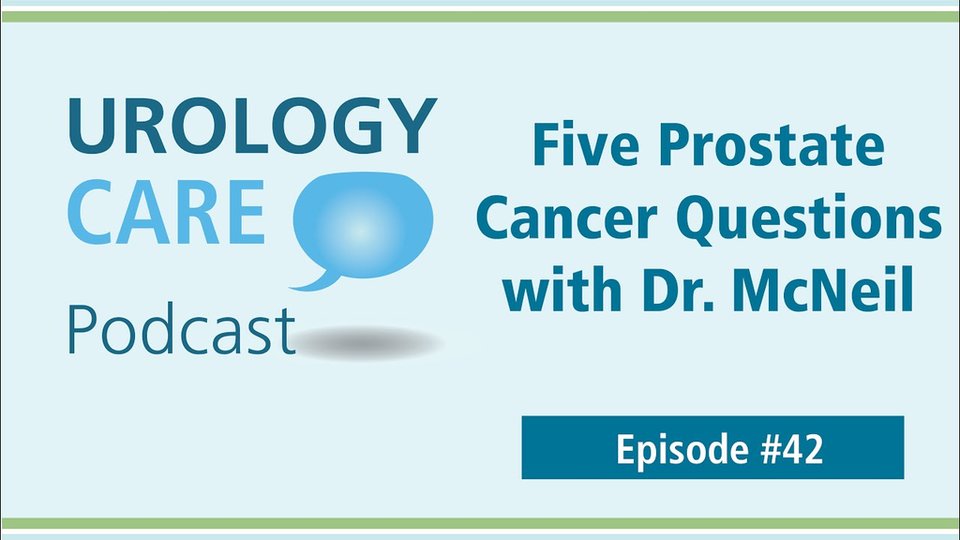| FEATURE |
Who is at Risk for Prostate Cancer?
Prostate cancer happens when cancer cells form in the prostate gland. About 1 in 9 men will be told they have prostate cancer. As stated by the American Cancer Society, nearly 192,000 new cases of prostate cancer will be found this year and roughly 33,000 men will die from the disease.
The prostate is a gland in the male reproductive system. It helps makes the fluid that carries sperm (semen) and is about the size of a walnut. The prostate gland sits just below the bladder, which is the organ that collects and empties urine, and is in front of the rectum (the lower part of the large intestine that ends at the anus). The prostate also surrounds part of the urethra, or the tube that empties urine from the bladder. That’s why some men experience urination problems when they have prostate cancer or an enlarged prostate.
Your risk factors for prostate cancer rise if you are age 65 or older, have a family history of prostate cancer, are African American or having inherited mutations of the BRCA1 or BRCA2 genes. Signs and symptoms of prostate cancer may involve a weak urine flow or one that starts and stops, low back pain, pain with ejaculation or urination and blood in your urine or semen.
The good news is that many men survive prostate cancer. For example, there are more than 3 million men in the US who consider themselves prostate cancer survivors.
“There are a number of things that we can do if someone is told they have prostate cancer,” said Brian McNeil, MD, a urologist with SUNY Downstate Health Sciences University in Brooklyn, New York. “The most important thing is for men to have a talk with their doctor about when to start prostate cancer screening.”
Age
Prostate cancer is rare in men under the age of 40. In general, the risk of getting prostate cancer grows with age. About 6 out of 10 men diagnosed with prostate cancer are 65 or older. And the average age of prostate cancer diagnosis in the US is 66.
“If you're younger than 40, I would not get screened for prostate cancer,” said Dr. McNeil. “If you're in between the ages of 55 and 69 with an average risk for prostate cancer, have a conversation with your doctor about prostate cancer screening. If someone in your family has been diagnosed with prostate cancer, you should have the discussion with your doctor earlier than 55, and if you're Black or African American, start having that talk when you're 45.”
African American Race
About 1 in 6 African American men will be told they have prostate cancer. African American men are more than twice as likely to die from prostate cancer than other men. They’re also more likely to be diagnosed with prostate cancer at younger ages and have more aggressive forms of prostate cancer. That means that the prostate cancer may grow more quickly and spread to other parts of the body faster than in men of other races. It’s not clear why prostate cancer affects African American men more than other racial/ethnic groups. The good news is that there are ways to screen for prostate cancer and varied treatment options to help men deal with the disease.
Prostate Cancer Screening
The word “screening” means to look for cancer before a person has any symptoms. Screening helps find cancer at earlier stages when it may be simpler to treat. Prostate cancer screening involves the prostate-specific antigen (PSA) blood test. A digital rectal exam may also be done as part of a prostate cancer screening. This test screens for lumps in the prostate or anything else that seems unusual.
Genetic Factors
Some people say that cancer “runs in the family.” That’s partly true. Some prostate cancer patients do not have a family history of the disease. But having a close family member with prostate cancer may raise your risk, especially if prostate cancer was found in that family member before the age of 55. If a man’s father, brother or son had prostate cancer, that man is 2 to 3 times more likely to develop prostate cancer. Having family members with breast and ovarian cancer also raises a man’s risk for developing prostate cancer. That’s because breast, ovarian and prostate cancers share some of the same genes including BRCA1 and BRCA2. A gene is the basic physical and functional unit of heredity. Genes are made up of DNA.
“Most people don't know what the BRCA1 and BRCA2 genes are and why they are important,” said McNeil. “Sometimes there are mistakes or errors in our DNA. BRCA1 and BRCA2 are genes that are involved in the repair of DNA. They help fix mistakes in DNA. If there’s a mutation in BRCA1 or BRCA2, then your DNA isn’t able to repair itself as well as it could otherwise. So there could be mistakes and those mistakes could lead to cancer.”
Though the risk of getting prostate cancer is impacted by both the BRCA1 and BRCA2 gene mutations, BRCA2 appears to play a larger role in prostate cancer. One study found that BRCA2 mutations were linked to more aggressive prostate cancers and poorer outcomes.
If your urologist suggests genetic testing because of family history or because you have an aggressive prostate cancer, they may give you a referral to see a genetic counselor. Genetic testing looks for certain inherited changes (mutations) in a person’s genes and can help determine if a cancer is hereditary. About 5 to 10 percent of all prostate cancers are believed to be hereditary.
Your urologist may also order genetic tests directly and only send you for genetic counseling if the results are positive or uncertain. To find out if you have a genetic mutation linked to prostate cancer, you may take a simple blood or saliva test. Health insurance groups often cover genetic testing and counseling if they are considered medically necessary.
Treatment Options
A urologist is one type of specialist who can treat prostate cancer. A urologist may suggest different treatments based the characteristics of your prostate cancer and your goals for care. For example, some men want to get the prostate cancer removed as soon as possible so they don’t have to worry about it. Other men may choose to avoid certain treatments because they’re worried about incontinence (leaking urine) or the erectile dysfunction that may result from prostate cancer treatment.
Treatment options for early stageprostate cancer may include active surveillance, surgery and radiation therapy. Active surveillance involves closely watching the prostate cancer for any sign that the cancer may be growing or changing. With active surveillance, you don’t have to decide on a treatment right away.
“Active surveillance is great for some men, but it’s not for everyone,” said Dr. McNeil. “As long as you have an open and honest talk with your doctor about what your concerns are, we can help you to make the best decision for you.”
More Information
Learn more by listening to our prostate cancer podcast episode with Dr. McNeil below.
To help make the best decision about screening for prostate cancer, download our Prostate Cancer Screening Assessment Tool in English or Spanish.

Click on the puzzle to download and fill out our prostate cancer crossword puzzle to test your knowledge!
Need some help?
Read through the feature article or visit UrologyHealth.org/Crossword to check your answers.
UrologyHealth.org | WINTER 2020/2021 | UROLOGYHEALTH extra
